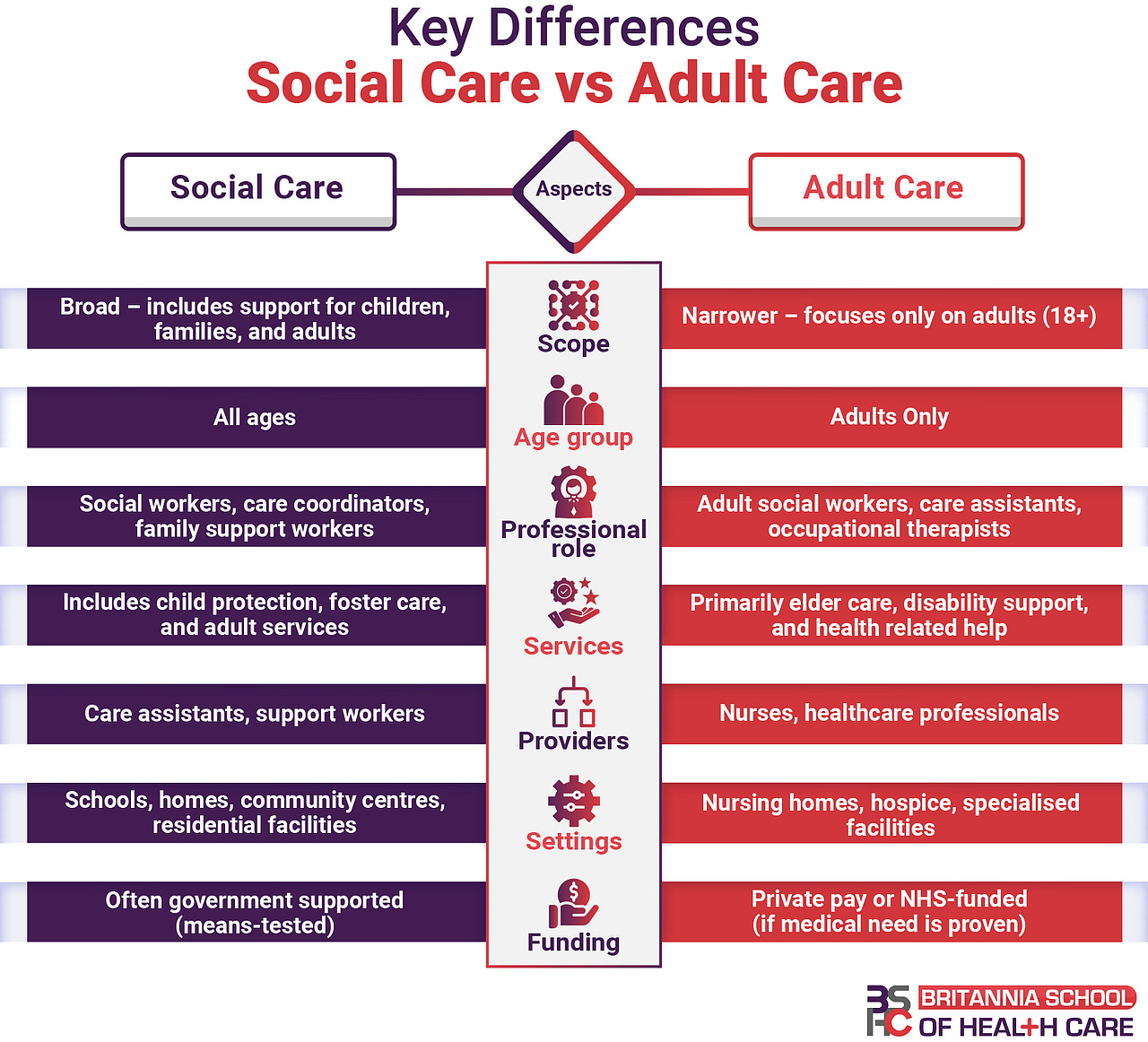In the UK and various regions globally, the terms social care and adult care are frequently used interchangeably, resulting in confusion among the general public and even those looking to enter the profession. Although they are interconnected, each possesses a distinct focus, scope, and purpose. Understanding the difference is crucial, whether you are contemplating a career in caregiving, looking for assistance for a family member, or aiming to navigate the complexities of the care system.
This blog will delineate the differences between social care and adult care, examine their collaborative dynamics, and articulate the importance of both in fostering a well-functioning society.
What is Social Care?
Social care is a broad term that refers to support provided to individuals who need help with daily living due to age, disability, illness, or other challenges. It focuses on improving quality of life, independence, and social well-being.
Who Needs Social Care?
The following groups are most likely to need social care:
- Older adults who struggle with mobility or daily tasks
- People with physical or learning disabilities
- Individuals recovering from illness or surgery
- Those with mental health conditions
- People with sensory impairments
Why Understanding Who Needs Social Care Matters?
Identifying who needs social care ensures that the right support reaches the right people at the right time. Whether you’re a family member, care professional, or policymaker, understanding care needs helps in planning and delivering effective, person-centred services.
What is Adult Care?
Adult care is a subset of social care, specifically designed for adults aged 18+ who need assistance due to aging, disabilities, or chronic conditions. It is more focused on medical and personal care needs rather than broader social support.
Who Needs Adult Care?
Individuals who typically need adult care include:
- Older adults and the elderly
- Adults with physical disabilities
- Adults with learning disabilities
- Adults with mental health conditions
- Unpaid carers in need of support
- Adults with degenerative conditions (e.g., dementia, Parkinson’s)
- Adults those needing rehabilitation after hospitalisation
Why Understanding Who Needs Adult Care is Important?
Knowing who qualifies for adult care helps families, care providers, and local authorities deliver the right services at the right time. Whether the support is temporary or long-term, adult care plays a vital role in enabling individuals to live well and safely, especially when medical care alone is not enough.
What are the Key Characteristics of Social Care and Adult Care?
Social care and adult care both provide essential support for individuals who need help with daily living due to age, disability, illness, or mental health conditions. While social care covers all age groups, adult care specifically supports individuals aged 18 and over. The key characteristics of Social Care and Adult care are following:
Person-Centred – Tailored to individual needs, preferences, and dignity, promoting autonomy and choice.
Non-Medical Focus – Provides practical and emotional support rather than clinical treatment.
Promotes Independence – Enables individuals to live safely and independently in their homes or communities.
Flexible Delivery Settings – Offered in homes, residential care, day centres, or supported living environments.
Professionally Delivered – Involves trained care professionals and is regulated to maintain quality and safety.
Public and Private Funding – May be funded by local authorities or self-funded through private means.
Short- or Long-Term Care – Includes both temporary support (e.g., post-hospital care) and ongoing, long-term assistance.
Safeguarding-Focused – Prioritises protection from abuse, neglect, and harm.
How do Social Care and Adult care differs?
While closely related, social care and adult care are not the same. Understanding the difference helps individuals, families, and professionals access the right services and support.
- Scope and Focus
- Age group
- Types of support
- Service providers
- Settings

Which One is Right for You or Your Loved One?
Choosing between social care and adult care depends on:
🔹 Level of Need – Does the person require medical attention, or just daily support?
🔹 Independence Goals – Do they want to stay at home, or is a care facility better?
🔹 Budget – Is public funding available, or is private care necessary?
If the person needs help with daily tasks but is generally healthy, social care may be sufficient. If they have complex medical needs, adult care (like a nursing home) might be the best option.
If you enjoy making personal, practical differences in people’s daily lives, helping them wash, cook, or attend appointments, adult care might be your calling.
If you are more interested in working with diverse age groups and tackling wider issues like housing, safeguarding, or mental health, social care offers broad and varied paths.
The Bigger Picture: Why This Matters
Choosing the right care can mean the difference between just surviving and truly thriving. Whether it’s social care’s focus on dignity or adult care’s medical safety net, the right choice ensures better quality of life.
Final Thoughts
Both social care and adult care play vital roles in supporting vulnerable individuals, but they serve different purposes. Understanding these differences helps in making informed decisions for yourself or your loved ones. While social care and adult care are closely linked, they are not the same. Social care spans a wide range of services across all ages, while adult care is a more focused area helping adults with daily living and personal support. Whether you are a family member, a student, or a career-changer, understanding this difference helps you make informed choices whether it’s accessing the right service or starting the right career.
Ready to explore a career in adult care or social care?
Start by looking into qualifications like:
- Level 2 Certificate in Preparing to Work in Adult Social Care
- Level 3 Diploma in Adult Care
- Level 5 Diploma in Leadership for Health and Social Care
Care starts with knowledge—so take your first step today.

